By: Izumi Hasegawa October 21, 2016
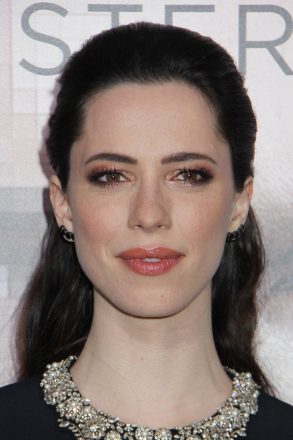
Rebecca Hall showed up with short cut hair and white dress at the interview for her new film, Christine. Hall plays title role of Christine Chubbuck a news reporter who in 1974 committed suicide while on the air. Aware of the responsibility of playing the person not just a character, Hall dove into research, unfortunately there was not a whole lot to go off of on the fateful day. In our interview with Hall she shares what she did for research and to prepare for this role. She also shares her thoughts on being a woman in journalism, working with her husband, her wedding anniversary, and the Michael C. Hall/Dexter connection with Marvel Films!
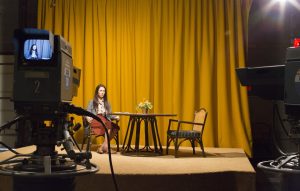 Q: There are a lot of heavy subjects that surround this film? How did you prepare for that? Was research or just let the script speak to you?
Q: There are a lot of heavy subjects that surround this film? How did you prepare for that? Was research or just let the script speak to you?
I did spend three months preparing. The actual film took 29 days to shoot. But I spent three months reading every book I could read about depression, about bipolar, about people on autistic spectrums, about people who have suicidal impulses, survivors of people who have gone through suicide. And I really did do all that stuff. And I also did slightly more superficial stuff. I watched an awful lot of 70’s films and 70’s television. I tried to saturate myself in the period. Because there’s something, I think there’s a sort of quality that you have to be familiar with because otherwise you can be in a period film as an actor and it looks like you are playing dress up. As opposed to it being something that’s natural. So that was something that I did. But so much of it was instinctive and imaginative. I had fifteen minutes of footage of her.
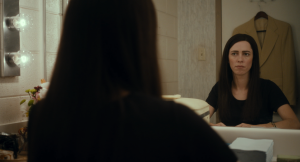 Q: Even though you only had those fifteen minutes to view, did you get technical details like mannerisms, or the voice even?
Q: Even though you only had those fifteen minutes to view, did you get technical details like mannerisms, or the voice even?
Those things were helpful; I didn’t feel hemmed in by them. It can’t be impersonation when you only have fifteen minutes. It’s very specific. It’s not like I can know for sure how she would be in moments of high anger or high sadness. I’m looking at her while she’s on television when she’s performing something already. She’s performing a very controlled version of herself. But I did pick up things that I think are very true to her. Like there’s a gesture like this with the hair that happens in slow-mo towards the end. And that is something that she did. I noticed that there were gestures admissive on TV show that were very controlled like when a politician does these sorts of learned gestures. This is how I am presenting it as an image of control. And those were all things that I became fascinated by for sure. Because I wanted to capture the spirit of her while making it feel true to me.
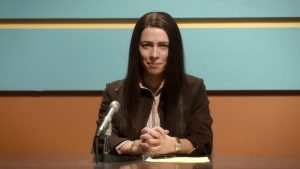 Q: I personally found this film interesting because I was a broadcaster in Japan and I went through similar experiences that Christine had being a female journalist in a man’s world. Ironically this story happened forty years ago and here we are and not a whole lot has changed. What also has not changed is the public’s insatiable appetite for juicy stories at the same time, the audience and people haven’t changed as well. They are still looking for juicy stories. All of that being said, As an actress, in working in this industry, as a celebrity, how do you see this society, and how do you see the structure in the acting world in Hollywood?
Q: I personally found this film interesting because I was a broadcaster in Japan and I went through similar experiences that Christine had being a female journalist in a man’s world. Ironically this story happened forty years ago and here we are and not a whole lot has changed. What also has not changed is the public’s insatiable appetite for juicy stories at the same time, the audience and people haven’t changed as well. They are still looking for juicy stories. All of that being said, As an actress, in working in this industry, as a celebrity, how do you see this society, and how do you see the structure in the acting world in Hollywood?
Everything you say is true. And I agree with you. I watch this film and yes it’s a woman dealing with serious mental health issues and profound sense of isolation. There are also some quite basic things that we can relate to. What do we expect of a woman in this world? And how do we judge her versus a man in that position in terms of likeability. Christine doesn’t do a good job at being feminine and being what people want of her. And I don’t look at it and go; oh that’s an interesting piece of history. Look how far we’ve come alone. I still think the same things now and funny enough there’s this ironic parallel. I don’t get to play roles like this very often, because they are challenging and unlikable. They are human. I think it’s quite easy to humanize characters who are good, who are heroic, and virtuous. Even characters who are victims of terrible things done to them, it’s really crucial I think to humanize the ones that we don’t understand that we would rather look away from. And that’s hard whether you are a man or woman, but there are more instances of tragic, the format of tragedy. They’ve got a great tragedy, he’s out there in the story telling world the every male character is always the man, and this is the example of one where it’s a woman. You ask me, do I see the parallels. Yes because I haven’t played a bunch of these characters and women don’t. So there has to be something in that.
Q: Prior to doing this film your views of media came from the side of the celebrity. Now that that you got a first hand look into a story from the journalist’s side, what was your biggest discovery of how Christine possibly viewed things?
It’s hard because there’s this sense of- You get a sense of blame for Mike. You get the impression that he’s operating from a higher mandate, and then you get Christine who just wants to report what’s true. There’s the strawberry festival, but there isn’t any blood and guts. So what am I supposed to do in that situation? This is preposterous and ridiculous and I got into this because I wanted to serve people the truth and not manipulate or get the ad revenue. I know that’s a thing that all of you guys deal with.
Q: How was working with your husband (Morgan Spector, played Dr. Parsons) in this role?
It was sort of a tiny happy circumstance. I had spent three months prepping that, and during the course of prep time, Antonio (Campos, director) and my husband had become good friends. The first thing that we shot was the doctor stuff. Honestly it was a funny in-joke. Most of it was the fact that Antonio knew it was going to be scary for me, but it would be nice that I knew someone on the first day to warm up to. It was really important to have him there for the whole shoot. He wasn’t on set every day; he was where we were living. It was really important to me to go home at the end of the day, after having played that person. Walking in and remembering what it’s like to be you and here’s a martini; let’s sit down and relax.
Q: Your anniversary was a couple days ago (Note: Our interview with Rebecca was on Sep. 29th), how did you celebrate?
We live in New York; he’s in Halifax shooting something. I was in New York before coming to LA. I’m just like where am I? [Laughs] Hang on a minute where am I? That’s troubling. He managed to get one day off, so we met in New York so we had the day together. It was good.
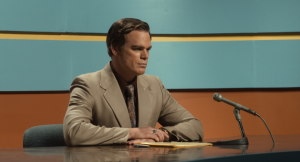 Q: What was it like working with Michael C. Hall who is sharing same last name? [laughs]
Q: What was it like working with Michael C. Hall who is sharing same last name? [laughs]
He’s a really classy actor. There isn’t a single actor in there that isn’t. They all come from theatre and there’s a real sense that we were given a job and we’ve got to do it. We’ve created this world and support this person. It felt like I was walking around with a bunch of actors who literally have my back. They knew what was going on at all times, and were listening to everyone all the time. Also we were shooting in an abandoned television station, which was weird. It was falling apart; there weren’t any trailers or anything like that. There were holes in the ceiling. There was a downstairs and places we could sit upstairs which was not glamorous at all. We were all on top of each other. Nobody was doing this for any other reason than they loved it. It felt like an important thing to do.
Q: You are going to work with Dan Stevens for Permission. I heard you guys were roommates once, fill me in.
We went to college together. I met him in university, and we’ve been very good friends since then. We shared a house with two other people in our mid-twenties for a couple years.
Q: Now you are both successful actors, do you see anything that has changed or shifted? How often do you guys see each other?
I see him the same. He lives down the road to me, and I’m godmother to his kids. I see him all the time.
Q: Is there anything that feels different between working on this film versus a big Marvel film?
It’s completely different; it’s like night and day. It’s just different, the operation is different. It was a blessing and a curse that we had 29 days. It was incredibly hard to go scene to scene and get everything compact in one or two takes. It was frightening and hard and honestly if it had been a studio film I probably wouldn’t have been able to handle it. It was kind of a blessing that I could just dive in then do it. Long ago it would’ve been too emotionally and physically draining. That being said, people should give artists longer and more time [laughs].
Christine opens theaters on Oct. 21st
Interview by: Izumi Hasegawa @HNW_Izumi
Edited by: Jody Taylor – @RealJodyTaylor
Follow Us: What’s Up Hollywood at @WhatsUpHWood
